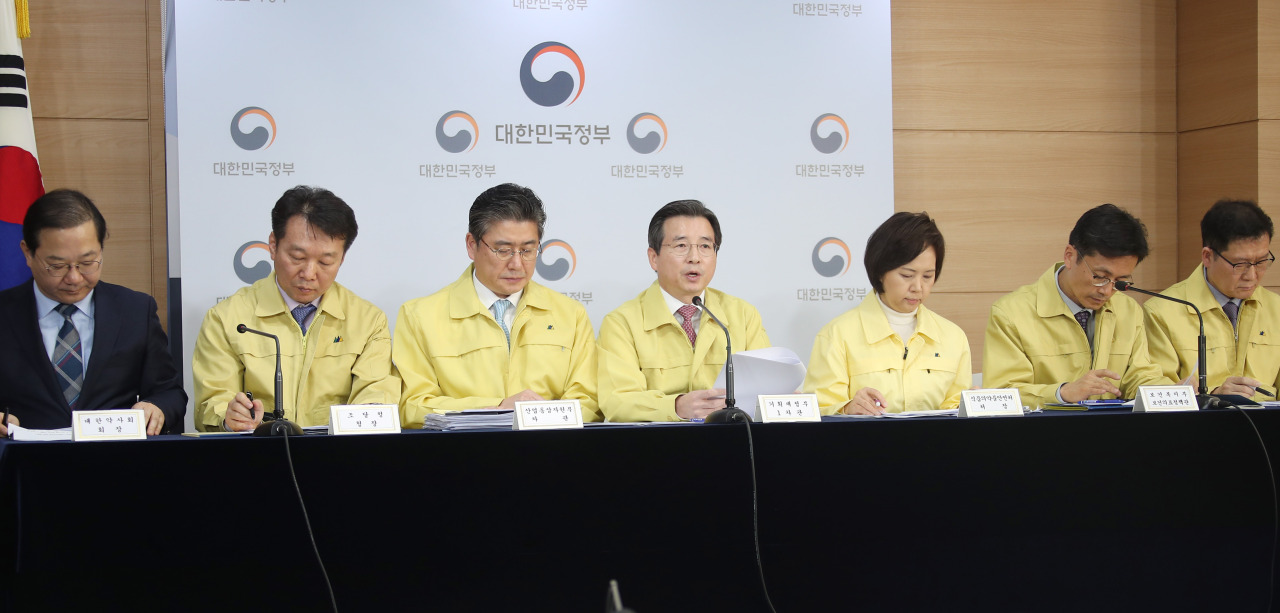 |
Vice Finance Minister Kim Yong-beom (second from right) announces government measures to stabilize supply and demand of face masks at a press briefing held at Seoul Government Complex on Thursday. Ranking officials from other ministries handling matters related to coronavirus, including Vice Minister of Trade, Industry and Energy Chung Seung-il (second from left) and Food and Drug Safety Minister Lee Eui-kyung (first from right) joined Kim in the briefing. Yonhap |
The South Korean government said Thursday it will take full control of face masks distributed via public channels, and ban local companies from exporting them to cope with the severe supply shortage amid rising cases of coronavirus.
“To distribute face masks swiftly and fairly to all citizens, the government has decided to fundamentally manage the entire process of production, logistics and distribution,” the Ministry of Economy and Finance and other agencies monitoring the COVID-19 outbreak said in a joint press release.
Exports of masks will be fully banned, replacing the previous measure of allowing maximum 10 percent outbound shipments of the total output here.
Mandatory distribution of face masks to local pharmacies, post offices and stores operated by the National Agriculture Cooperative Federation (NongHyup) will be increased to 80 percent from 50 percent of the total supply -- costing 1,500 won ($1.27) each.
The government said it would set a price limit on the remaining 20 percent, which will be privately sold at other venues, if necessary.
“The government will ban mask exports to secure its supply volume and redistribute the ones seized from illegal hoarders,” Vice Finance Minister Kim Yong-beom said in a press briefing held in line with the COVID-19 press release.
“We will also bolster support for the manufacturers,” he added.
To establish a fair system, the government will limit weekly sales of face masks sold in local pharmacies to two for every customer from Friday. It will also adopt the odd-even rule from Monday -- customers born on odd days can purchase masks on odd days and vice-versa.
Pharmacies, post offices and NongHyup stores will establish a digital system that will prevent customers from making excessive purchases. Pharmacies will check their identification cards, while the other two will merely limit sales of face masks to one per person a week, until their respective systems are established.
Expats will be required to present their health insurance documents and alien registration cards.
Distributions to medical facilities and special quarantine areas will be prioritized.
The government noted that the nation’s daily production of face masks has doubled to an average of around 10 million following its emergency measures adopted on Feb. 12.
An emergency Cabinet meeting, presided by Prime Minister Chung Se-kyun was also held earlier in the day.
Chung vowed to resolve the imbalance in supply and demand for melt-blown nonwoven fabrics, materials used to produce mask filters.
Korea has now joined global economies, including Germany, that have banned the export of medical protection gears to avoid local supply shortage.
As of Thursday, the nation saw 5,766 confirmed cases of the novel coronavirus, including 35 deaths, according to the Korea Centers for Disease Control and Prevention.
By Jung Min-kyung (
mkjung@heraldcorp.com)








